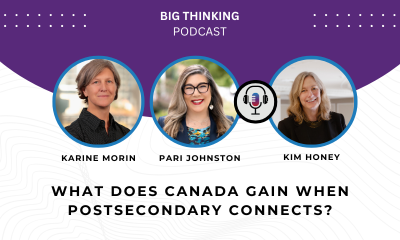The Federation for the Humanities and Social Sciences hosted Elder Aimee Bailey to share teachings at Congress 2022. Elder Bailey is a Knowledge Keeper from the Algonquins of Pikwakanagan First Nation, the Spokesperson for The Circle of Turtle Lodge, and an Algonquin College graduate. She holds an Honours Degree in the Humanities from York University and a postgraduate Certificate as a Traditional Practitioner from First Nations Technical Institute (FNTI). Being from the Sturgeon Clan, who are the educators in Traditional communities, Elder Bailey suggested that participants think of her as a Reference Librarian. She positioned herself as someone to help participants find answers to any cultural questions, either from knowledge and experience or by making connections to her wide and varied network of other Indigenous people.
Elder Bailey first told us about The Mishomis Book, written by Edward Benton-Banai. Benton-Banai drew from the Teachings of the Seven Grandfathers and wrote them in The Mishomis Book to help others learn about Anishinaabe stories and ways of life. Elder Bailey recounted many of the stories and the teachings from each tale to participants, then invited us to ask any questions we had.
Reflecting on the Congress 2022 theme of Transitions, and the many discussions that have taken place throughout conference on EDID and reconciliation, I asked her – what do we need to do to have a more fundamentally ethical relationship with Indigenous peoples?
In response, she gave me a homework assignment.
Elder Bailey suggested that I, and the other participants gathered to listen to her, work on our own personal land acknowledgement statement. These statements should not just be given when meeting with Indigenous peoples, but at all meetings we have. When thinking about acknowledging the land, we must think about the lands that we came from, the lands we live on now, and the lands where our ancestors came from. As people living on the lands now claimed as Canada, we have a responsibility to understand and honour the treaties that this nation was built on.
Elder Bailey also challenged us to go one step further, and to ask ourselves why did your ancestors come to this land? What did they do when they got here? What happened to the Indigenous peoples whose lands your ancestors settled on? How were your ancestors involved with Indigenous peoples, and what kind of relationships did they have? What is your legacy, and do you have authentic relationships with Indigenous peoples now? Once we all begin to think through the legacies and present of our relationships with Indigenous peoples, we can begin to achieve reconciliation.
That means if you’re reading this, this homework assignment is now yours too.

What does Canada gain when postsecondary connects?
← Big Thinking Podcast homepage Introduction | About the guests | Transcript | Follow us Introduction Canada’s future is being written in the places where people learn and in how those places connect. If collaboration holds the key to shaping that...

Canada's AI leadership calls for all expertise at the table
After bringing together humanities and social sciences AI experts for a consultation with the federal government’s AI Strategy Task Force on October 20, the Federation submitted the following on October 31. Written submission to the AI Task Force...

Building a strong research future with Budget 2025
On November 4, 2025, the federal government tabled its 2025 Budget: Canada Strong. Through its investment to attract international talent, this Budget recognizes the vitally important work of researchers. Notably, Budget 2025 commits $1 billion over...
